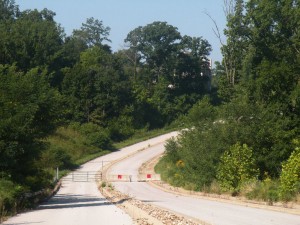Nine years after work began on Forest Lakes subdivision in Caseyville, crumbling streets and a lonely, unfinished, million-dollar home are the results of over $30 million in investment.
Zombie subdivisions, those abandoned during construction and before any residents moved in, became more common after the housing market crash. Forest Lakes is the grandest example in the Metro East.
Caseyville Holding Company LLC, the new ownership group, is attempting to revive the project, in part, by requesting a 12-year tax increment financing extension that would run until 2034. Representatives of the group appeared before the Unit 10 School Board on Sept. 5, and the board’s budget committee on Sept. 11, to initiate discussions for a potential deal that would allow the development to survive without harming the district.
The failed subdivision is a blemish on Southern Illinois, Joe Koppeis, owner of Admiral Parkway Inc., a development company in Columbia, Ill., told the board at the Sept. 5 meeting. Koppeis said the problem is not the board’s, but he was asking for their help to find a way “that everyone can get something, rather than everyone lose everything.”
Residential TIFs are difficult and unpopular, Koppeis said. “If we were starting from the beginning, I’d say don’t do it, but we’re all in a big tub of poop and we need to figure a way out.”
In an acknowledgement that a typical TIF deal – in which the school district receives no revenue from property taxes – would most likely be rejected, Caseyville Holding laid the groundwork for an alternate arrangement at the School Board’s Sept. 11 budget committee.
Allen Schmale, of United Community Bank of Chatham – which holds the largest interest in Caseyville Holding, and was an investor in the original project – presented the framework for an agreement that would give the Unit 10 school district 50 percent of property tax revenue generated from the subdivision. The arrangement would go into effect after the original TIF ends in October 2021 and last until the extension would expire in 2034.
Based on projections compiled by Caseyville Holding and McBride and Son Homes, the proposed homebuilder for the development, the district would receive about $11.8 million during the life of the extended TIF. The holding company would receive the same amount, plus $500 per lot levied as a special services tax. The projections estimated 337 lots.
School Board members voiced concerns about the lack of space available to house the new students that would come from the revived development. Unit 10 has about 6,650 students in its 11 schools, all of which are at or near capacity. Enrollment in the district has been growing steadily. Superintendent Robert Green is currently working with administrators to devise a draft plan to accommodate additional students in the event of another enrollment increase.
The budget committee asked Caseyville Holding to consider building a new elementary school to accommodate the estimated 450 new students in the district. The committee suggested the building accommodate 1000 students, which would make it nearly twice the size of Renfro, the district’s current largest capacity school, with a maximum enrollment of 568.
According to Illinois State Board of Education space requirements, a new elementary school with capacity for 1,000 students would be approximately 105,000 square-feet and cost $17.25 million. The cost estimate is based on information provided by Reed Construction Data, a North American provider of construction information.
“I’ve wondered how this could have happened, and what happened, hundreds of times.”
The original developer of Forest Lakes was Caseyville Sport Choice LLC, a division of Sport Choice LLC, of Gold River, CA. The project was abandoned when Sport Choice filed for bankruptcy.
The land was approved for residential tax increment financing on Oct. 21, 1998. Caseyville sold about $31 million in TIF Senior Revenue Bonds in 2004 to fund the work completed to date at the site. The bonds will be payable if revenue is generated from the development.
The original plans for the 500-acre site, located at Illinois Route 159 and George E. Chance Parkway to the west and Illinois Route 157 to the east, called for 625 residences. Townhomes were to start at $240,000, with single-family homes ranging from $300,000 to $1 million.
Hiking trails, horse trails and parks would have been part of enclave, along with a large retail area along Illinois Route 159. The original project was the largest Koppeis has ever seen attempted at one time, he said.
Work on the project, which began with a redevelopment agreement in 2004, included about one year of engineering, one year of platting and zoning and another year of infrastructure before building could start, Koppeis estimated. The grand project was a grand risk.
“I’ve wondered how this could have happened and what happened hundreds of times,” Koppeis said. “Were they overly aggressive? Did they get bad advice? Did they misread the market? I’m not sure.”
The modified plans call for single homes starting at $250,000, with the potential to add multi-family housing. The trails, parks and retail area are not part of the modified plan, which calls for the construction of 337 new homes by the end of 2022.
According to information from Caseyville Holding, the Village of Caseyville would receive 15 percent of any TIF proceeds until the bonds sold in 2004 mature, with the bondholders receiving the other 85 percent. Caseyville Holding attempted to work a deal with the bondholders before approaching the school board, but the deal fell through, Koppies said.
What next?
The failed deal with the bondholders left Caseyville Holding with only one option, to request a TIF extension, Koppeis said. In addition to meeting with the School Board, Caseyville Holding has met with Caseyville officials, Koppeis said, but only to inform them of the development’s progress.
Although Koppeis said he did not expect opposition from other Unit 10 taxing bodies, Caseyville Holdings does not plan to meet with the bodies if a deal cannot be reached with the School Board. If no deal is agreed, “we’ll call the auctioneer,” Koppeis said.
Caseyville Holding is close to finalizing a proposal to present to the School Board, Green said. Unit 10 auditors will first vet the proposal, at the expense of Caseyville Holding.
The proposal will likely face a skeptical School Board, whose members made clear, during questioning of Schmale and Koppeis at the Sept. 5 board meeting, their intentions to not further burden the Unit 10 taxpayers. School Board President Gary Peccola questions if district residents would welcome the subdivision, given its potential impact on the school district.
“I doubt the taxpayers would be willing to raise their property taxes for this,” Peccola said.




